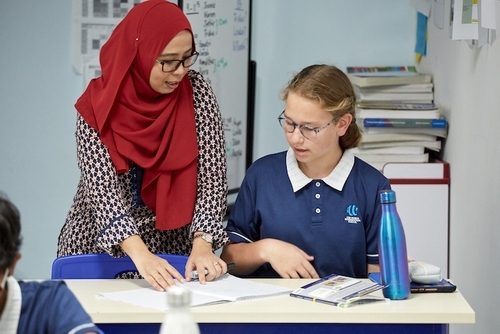Secondary students are no strangers to assessments. They are assessed at different points throughout the academic year and each of their various courses. The results of their assessments can provide students with the information they need to gauge where they are at in their programme of study, but without the right type of feedback, they will not be able to improve. Giving students timely, relevant and diagnostic feedback is a critical part of the assessment process and allows students to understand their areas of success and areas for improvement.
Diagnostic Feedback: What is it and why is it important?
Assessments and exams are an important tool in the educational process. They are valuable in checking students’ understanding of concepts and measuring students’ learning. However, only when students get meaningful, diagnostic feedback on their performance, are they able to make sense of their performance in context to the required learning objectives and use this strategically to make more progress.
Diagnostic feedback is specific, meaningful and personalised for each student. It lets them know where they are doing well and outlines areas and methods for improvement.
Diagnostic feedback allows students to have a better understanding of their own strengths and to develop a plan to grow throughout the course. It can help students learn how and where to improve and to capitalise on their learning. It can also help them improve their examination skills. This is particularly important when students prepare to take exams at the end of their IGCSE and International Baccalaureate Diploma Programme courses.

Methods for Meaningful Feedback
Generic feedback is not enough for secondary students, who must apply the feedback they receive to their daily lessons and activities. They need to have the information and resources in order to improve and grow.
At One World International School, we have developed a system for providing our secondary students with different types of meaningful feedback. By providing meaningful diagnostic feedback, students have in-depth access to the curriculum. Our students receive feedback in the following ways:
Verbal Feedback — Verbal feedback is often offered in a one-to-one setting, where the student can take notes on the feedback and apply it to their unique circumstances. It is typically used when a student needs to refocus their tasks or priorities, or when a misconception needs to be addressed quickly.
Light Touch Written Feedback — This feedback is provided by the teachers on the students’ assignments, typically in the form of quick notes or edits. Teachers use this type of feedback in order to acknowledge the progress or completion of assignments.
Self & Peer Assessment Written Feedback — Students and classmates are provided with a rubric for how to provide themselves and others with feedback, and they practise this skill in the classroom. The rubrics that are used for peer assessments are agreed upon in advance, allowing for consistency in the type of feedback that students receive from their peers.
Diagnostic Comments — These comments are provided after assessments have been evaluated. Diagnostic comments will be based on shared success criteria and will be designed to target areas for student improvement. Students have an opportunity to respond to diagnostic comments to deepen their understanding.
Deep Marking Written Feedback — Deep marking feedback is a form of in-depth diagnostic feedback that provides students with information about where they are and how they can improve in the future. It is based on shared success criteria and is tailored to the appropriate level of challenge for the individual student.

The Importance of Personalised Feedback
Teachers must make it a point to personalise the diagnostic feedback process. At OWIS, teachers are encouraged to provide personalised feedback that details what a student did well and how they can become better in the future. Personalised feedback at OWIS is:
- Specific
- Measurable
- Achievable
- Relevant
- Time Orientated
By crafting feedback that meets all of these criteria, teachers are able to help students create actionable goals and SMART targets for their own learning experience.
Diagnostic Feedback and its Connection to Growth Mindset
Diagnostic feedback is designed to help students better understand their assessment results. When they receive and evaluate their assessment feedback, they will have a better understanding of where they are on their own personal learning journey. This is a pivotal step in developing and improving their growth mindset. With a growth mindset, students understand where they are now and how they can get to where they want to be in the future. By giving students actionable steps and realistic goals, they will feel in control of their own learning process and will be more accountable for their own achievements in the future.
To know more about OWIS, contact our Admissions Counsellor today or book a school tour.
(This blog was originally written in collaboration with Ms Luna Deller, former Deputy Head of School, OWIS Nanyang.)














